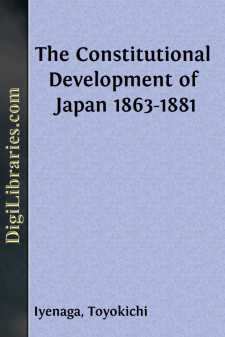Categories
- Antiques & Collectibles 13
- Architecture 36
- Art 48
- Bibles 22
- Biography & Autobiography 813
- Body, Mind & Spirit 142
- Business & Economics 28
- Children's Books 17
- Children's Fiction 14
- Computers 4
- Cooking 94
- Crafts & Hobbies 4
- Drama 346
- Education 46
- Family & Relationships 57
- Fiction 11829
- Games 19
- Gardening 17
- Health & Fitness 34
- History 1377
- House & Home 1
- Humor 147
- Juvenile Fiction 1873
- Juvenile Nonfiction 202
- Language Arts & Disciplines 88
- Law 16
- Literary Collections 686
- Literary Criticism 179
- Mathematics 13
- Medical 41
- Music 40
- Nature 179
- Non-Classifiable 1768
- Performing Arts 7
- Periodicals 1453
- Philosophy 64
- Photography 2
- Poetry 896
- Political Science 203
- Psychology 42
- Reference 154
- Religion 513
- Science 126
- Self-Help 84
- Social Science 81
- Sports & Recreation 34
- Study Aids 3
- Technology & Engineering 59
- Transportation 23
- Travel 463
- True Crime 29
The Constitutional Development of Japan 1863-1881
Description:
Excerpt
CHAPTER I.
BEGINNING OF THE CONSTITUTIONAL MOVEMENT.
The constitutional movement of Japan began in a spontaneous agitation of the whole body politic when the nation was irritated by the sudden contact with foreigners. The sense of national weakness added a force to this agitation. Had not the foreigners come, the Restoration might have been effected, feudalism might have been abolished, but the new Japanese constitution would hardly have seen the day. Had the government of Japan at the time of the advent of foreigners been in the strong hand of a Taiko or an Iyeyasu, the rulers might have been greatly exercised by the extraordinary event, but public opinion for reform would hardly have been called forth, and the birth of constitutional liberty would long have been delayed. As the vices of King John and the indifference and ignorance of the first two Georges of England begat the strength and hope of the English Parliament, so the public opinion of Japan sprouted out of the ruins of the Shogunate régime. We must therefore seek for the beginning of the Constitutional Movement of Japan in the peculiar circumstances in which she found herself between 1853 and 1868.
The advent of Commodore Perry in 1853 was to Japan like the intrusion of a foreign queen into a beehive. The country was stirred to its depth. Let us note what a native chronicler says about the condition of Japan at the arrival of Perry:
"It was in the summer of 1853 that an individual named Perry, who called himself the envoy of the United States of America, suddenly arrived at Uraga, in the Province of Sagami, with four ships of war, declaring that he brought a letter from his country to Japan and that he wished to deliver it to the sovereign. The governor of the place, Toda Idzu No Kami, much alarmed by this extraordinary event, hastened to the spot to inform himself of its meaning. The envoy stated, in reply to questions, that he desired to see a chief minister in order to explain the object of his visit and to hand over to him the letter with which he was charged. The governor then despatched a messenger on horseback with all haste to carry this information to the castle of Yedo, where a great scene of confusion ensued on his arrival. Fresh messengers followed, and the Shogun Iyeyoshi, on receiving them, was exceedingly troubled, and summoned all the officials to a council. At first the affair seemed so sudden and so formidable that they were too alarmed to open their mouths, but in the end orders were issued to the great clans to keep strict watch at various points on the shore, as it was possible that the 'barbarian' vessels might proceed to commit acts of violence. Presently a learned Chinese scholar was sent to Uraga, had an interview with the American envoy, and returned with the letter, which expressed the desire of the United States to establish friendship and intercourse with Japan, and said, according to this account, that if they met with a refusal they should commence hostilities. Thereupon the Shogun was greatly distressed, and again summoned a council....


